We like to share product recommendations with you and hope you like them! Just to make you aware Water Filter Data may collect a small share of sales or other compensation from the links on this page.
This article will give you a definitive overview of the home water softening system, how it works, and what you should take into consideration before you buy a water softener for your home. In short, this is our most comprehensive buying guide to choosing the best upflow water softeners on the market.






Why Should You get a Water Softener?
What is Hard Water exactly?
Hard water is water that is contaminated with dissolved calcium and magnesium ions. These minerals become less soluble at high temperatures and form a white precipitate (solid). This characteristic is what causes most of the problems with hardness.
Probably the most recognizable symptom of hard water is the white, flaky buildup often found on the kitchen faucets, bathroom faucets, showerheads, and other plumbing fixtures.
The scale is also found inside of those plumbing fixtures, as well as inside of pipes and appliances like water heaters or dishwashers.
Hard water can clog up your appliances and plumbing with scale, leave unsightly marks on glassware and dishes or make your clothes scratchy and grey.
What Makes Water Hard?
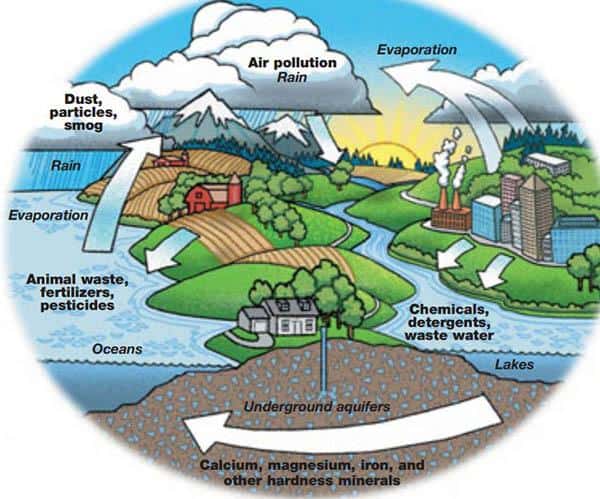
As rainwater falls, it is naturally soft. However, as water makes its way through the ground and into our waterways, it picks up minerals like chalk, lime, and mostly calcium and magnesium.
Calcium and magnesium dissolved in water are the two most common minerals that make water “hard.” The degree of hardness becomes greater as the calcium and magnesium content increases and is related to the concentration of multivalent cations dissolved in the water.
Effects of Hard Water?
The negative impacts of hard water on your home’s water system and the health of your family members are the primary reason why you should invest in the best water softener.
The amount of hardness minerals in water affects the amount of soap and detergent necessary for cleaning. Soap used in hard water combines with the minerals to form sticky soap curd. Some synthetic detergents are less effective in hard water because the active ingredient is partially inactivated by hardness, even though it stays dissolved.
Clothes laundered in hard water may feel harsh and scratchy. When doing laundry in hard water, soap curds lodge in the fabric during washing to make the fabric stiff and rough. Incomplete soil removal from laundry causes graying of white fabric and the loss of brightness in colors. A sour odor can develop in clothes.
Hard water can cause skin and hair problems. Eczema in children has been linked to hard water. Many people who bathe with hard water notice dry skin and even hard or bumpy patches of skin caused by dryness and irritation from skin and hair products. The many minerals that are present in hard water mean that the cleansing products used while showering don’t dissolve well in the water. This can lead to them irritating the skin when they don’t rinse off the skin well.
Drinking hard water can make you sick. According to the International Journal of Preventive Medicine, regular exposure to the density of minerals in hard water has many ill effects on the health of those who drink it. High levels of calcium and magnesium can affect several organs in the body and cause health problems.
Scale from hard water also significantly reduces the lifespan of appliances in your home. The heavy presence of minerals in hard water often leads to pipes becoming clogged. With clogged pipes, your appliances will run less efficiently.
Aside from the above, if left untreated, hard water can cause reduced water flow, and possibly higher energy and cleaning costs.
How Do Water Softeners Work?
Here are some benefits of having the best water softener system in your home:
- In the Bathroom: Your soap and shampoo will lather better. Your hair and skin will feel noticeably cleaner, softer, and not as dry. And there will be no soap scum or mineral deposits to clean off sinks, showers, tubs, and toilets.
- In the Kitchen: Dishes will clean up more easily, and be spot-free, without the gray film glasses get when etched by mineral-laden water. Plus hands will feel softer and look better.
- In the Laundry: Clothes will be softer, cleaner, whiter, and brighter. Plus they will last longer. Using soft water and pure soap products increases the life of clothing, towels, and linens up to 33%. Without hard water service issues, washing machines last longer, too.
- Throughout the House: Water-using appliances will last longer and run better. Why? Because hot water heaters, washing machines, and dishwashers used with hard water can wear out 30% faster.
Over time, soft water savings can really add up. For instance, conditioned water not only delivers greater washing powder but also reduces the amount of soap you need to use by up to 70%.
Types of water softeners
Water softeners help remove the minerals that make your water hard, such as calcium and magnesium. This can be done in several ways, depending on whether you want a whole-home solution or only on certain faucets.
Ion-Exchange Salt-Based System
The most effective water softener for your whole home is an ion exchange system with salt. They usually have two tanks, one for the softening resin (softener tank), and one for salt (brine tank). Some models come with two softening tanks, so you don’t have any downtime while one is being cleaned or regenerated.
Resin tank
Inside are lots of tiny beads covered in sodium or potassium (salt). As water passes over the beads, they attract the magnesium and calcium ions in the water and release the sodium ions, a process called ion exchange
Brine tank
The brine tank contains salt and water (brine) and flushes this through the softener tank. Reverse ion exchange takes place, and the hard water minerals are washed down the drain, and the salt ions are replaced on the resin.
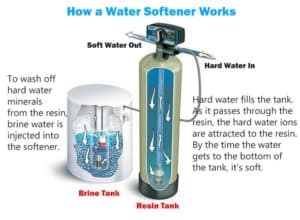
Warning
Due to the release of sodium into softened water, the salt content can be higher, so keep this in mind if you have high blood pressure or heart health issues
Demand Initiated Regeneration System
These systems are one of the most common. They work on the same principle as an ion exchange system, but they only regenerate the softener tank when it’s needed. They measure the amount of water that passes through the tank to calculate when the ions have become saturated and then start the cleaning process.
Template Assisted Crystallization (TAC) or Nucleation Assisted Crystallization (NAC)
These systems are salt-free and condition your water rather than soften it. They descale water by passing it through a TAC media, which converts the hard minerals into crystals. These crystals can’t adhere to pipes and appliances, and so don’t build up.
This could also be a more environmentally friendly option as you aren’t putting sodium into the drainage system, or wasting water cleaning them.
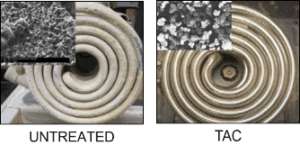
Chelation Systems
Similar to TAC systems, these are water conditioners. They use a chelating agent like nitriloacetic acid to attract hard water minerals. This suspends the minerals in the water, preventing them from attaching to your plumbing.
The method combining chelation and ultrafiltration might be in use to purify wastewaters from heavy metal ions.
The key advantages of this method are as follows: a high selectivity due to an employee of the selective poly ligands and its high specific productivity at insignificant power consumption.
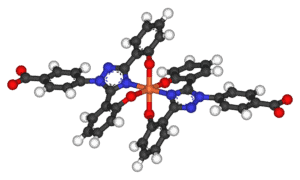
Magnetic or Electronic Water Softener
These devices are easy to fit and can provide conditioned water to your whole home. All you need is a power outlet near your incoming water supply. They then connect to a power supply and clip to the water pipe.
They go to work by creating magnetic fields that change the chemical composition of your water. They can help prevent scale from forming but don’t remove the hard minerals from water.
The effectiveness of these devices seems to remain questionable in comparison to ion exchange water softeners. Then again, they aren’t designed to soften water, just to prevent the deposits from forming.
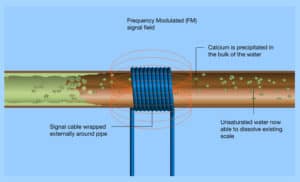
Reverse Osmosis System
If you don’t want a whole-home system, but want cleaner drinking water, a reverse osmosis system could fit the bill.
They generally fit under your sink and use multiple filters to remove contaminants from your water. These include calcium, magnesium, organic materials, and chemicals.
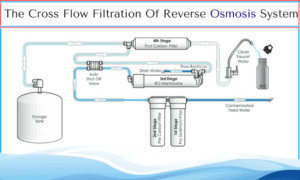
What Is An Upflow Water Softener/ Who Is This For
An up-flow water softener is a new norm and technology in the world of water softeners.
An up-flow water softener will inject your hard water to the bottom of the tank. This is where your resin settles down. It will then allow it to flow forward via the media layer before you get your result of soft water through the tap.
This kind of water softener undergoes an anti-gravity motion that stops it from producing a tunneling effect. It does not compress your tank’s resin
Upflow water softeners also use less salt and water, which makes it a cost-effective system. It also does not require any backwashing.
Ultimately, this type of water softener is what manufacturers are adopting today because it is more efficient. Yes, it is pricier, but you’ll reap more savings as time goes by.
This water softener unit is best recommended for folks who want soft water and take advantage of all the benefits that come with it. If you are looking for a high-efficiency water softener, then an upflow is for you.
How Does It Work
An upflow water system allows a more accurate recharge on the resin, so the system will just need to restore the depleted resin and not the whole resin tank.
This system pushes the hardness away from the resin and into the drain, which is the opposite of the downflow system that leads ‘dirty’ water through the treated charged, clean resin.
The upflow unit swirls the water, therefore removing channeling that can occur in a downflow water softener system, consequently getting an extended resin life.
The water softener principle of removing the hardness in your water via the exchange of water ions is still the same. It will remove the hard minerals, including magnesium and calcium, and exchange it to sodium or salt ions; thus, your soft water is produced.
The salt that is being released by the charged resin is contained in the softener. It is the same resin that is also responsible for trapping the magnesium and calcium ions of your water. In due course, the resin would release all its salt and accumulated ions, thus the need to regenerate.
Advantages And Disadvantages Of Using A Water Softener For Well Water
Advantages
Improves Water Mineral Content and Removes Toxins
Water softeners “soften” hard water as it replaces these particles with sodium. This, effectively lowers the concentration of these minerals, making them healthier for the user.
Moreover, water softeners, like a Springwell water softener, also remove numerous toxins in the water. With this, the user can avoid any potential health risks and problems.
Saves Money in the Long-run
Hard water can be a harbinger of numerous household problems. For one, its particle buildup can harm one’s appliances, leading to a shorter lifespan or frequent repairs.
With a water softener, these particles are significantly reduced. With this, one doesn’t have to worry about them anymore.
Obtain Soft Water
Having soft water at one’s disposal is undoubtedly very useful. For one, soft water is safer to drink compared to hard water. The reason is it removes all the hard particles as well as toxins and other contaminants found in the water.
Moreover, soft water also allows soap and other cleaning agents to work as they should. With hard water, it is difficult to remove stains since it tends to be resistant to cleaning agents. However, soft water makes cleaning easier.
Soft water is also known to be gentle on the skin and hair, unlike hard water. With this, soft water is ideal for those with sensitive skin.
Disadvantages
Too much sodium
Water softeners utilize sodium for the ion exchange process to work. With this, sodium can replace the ions of the hard minerals in the water and, thus, soften it.
However, there are some cases where water softeners end up using a bit too much sodium. It is not ideal for people that have problems with too much salt.
Expensive and Requires Maintenance
Water softeners can also tend to get expensive, especially if you are looking for an effective and high-end model. Moreover, these water softeners do require routine maintenance, especially when they are manual since the resin beads might be filled with particles.
Best Upflow Water Softeners Review
AFWFilters Fleck 64k Water Softener is suitable for the whole house, this 64,000-grain water softener comes fully loaded with eight percent crosslink resin.
It has a bypass valve, brine tank, and valve included. This means all you need to do is get it set up and you’re good to go.
The blue resin tank measures 48 inches by 12 inches and is made in the USA, and the brine tank is 15 inches by 17 inches by 33 inches.
Digitally Metered Control Valve
This system is fitted with a Fleck 5600SXT digital valve. This valve measures the water passing through the softener tank and regenerates only when needed. This means you could save on water and salt as it will only clean the system when it’s needed.
Warranty
After taking delivery of your system, the company offers technical support and after-sales care to help you install your unit, via a toll-free number. They’ll also answer any questions you have about programming your system.
Installation
The tanks come with an installation kit, which includes a standard 1-inch male national pipe thread. This should be easy to connect to your plumbing yourself.
Tier1 brings us an ion exchange water softener that has 48,000 grains of resin. It’s a whole-home system available in blue or black tanks. This basic system can remove hardness from your water, making your soap work better and preventing limescale buildup in pipes and appliances.
It regenerates within two hours, and this can be manually set to take place while you sleep at night. It has a digital control valve with an easy-to-read LCD, which gives you relevant information for your system. The information is clear and concise, so it shouldn’t confuse you.
Quick-Connect Fittings
All the fittings you need to hook this up to your water pipes are supplied with this system. It has three-quarter-inch connections, tubing for the brine tank and drain line, and all mechanical components.
Space Saving
The softener tank measures 54 inches high and 10 inches in diameter and the brine tank measures 14 inches by 42 inches. The proprietary turbine meter is incorporated in the bypass valve, meaning this whole unit takes up less room.
Demand Initiated Regeneration
The valve on this water softener is fitted with a water probe (propeller) that measures the amount of water you use. Based on this information, it will regenerate the resin tank when necessary, although you can set a manual override.
Water supply from a well can present homeowners with many challenges; after all, it’s your responsibility alone and is generally not regulated. Apart from harmful chemicals and bacteria, the chances are your water will be hard and could contain higher levels of iron.
The Iron Pro 2 is designed to soften water by removing hardness up to 75 gpg. It can also help remove iron in the 6–8 ppm range and manganese below 6 ppm. On top of that, the fine mesh resin can also help eliminate sediment, rust, and sand.
As well as less buildup in pipes and appliances, this system could help eliminate red rust stains on sinks and tubs, which result from iron in the water. The system has a flow rate of 16 gpm, making it suitable for households of up to seven people.
Meter-Based Regeneration
The system comes with a Fleck 5600SXT digital control, which operates on a metered regeneration. This means your system gets cleaned off the hard water minerals only when it needs to.
Peace of Mind
A 30-day satisfaction guarantee accompanies this system. If you decide to keep it, further warranties of five years on the control head and 10 years on the tanks are offered.
Complete System
This water softener comes with a softener tank containing a 64,000-grain count, fine mesh resin, a brine tank, a metered control, and a bypass valve. It has all you need to soften your hard water and remove some iron.
If you want an uninterrupted flow of softened water at all times, this dual tank system could fit the bill. Each tank contains 3 cubic feet of resin, offering 96,000 grains in total. This means more time between regenerations, saving on salt and water.
The advantage of two tanks is that while one regenerates, the other continues working, giving you a constant supply of water. You don’t have to worry that you might not have water at the kid’s bathtime or for your morning shower.
The flow rate of these tanks is 20 gallons per minute. This is great if you have several people getting ready for school and work in the morning, all using water. It means you can run your dishwasher and washing machine at the same time, too.
Demand Regeneration
The system comes fitted with a Fleck 9100SXT digital control head. It has a fiber-reinforced polymer valve body, making it durable and strong, an LCD with touchpad controls for setting adjustment, and a fitted bypass valve.
Large Brine Tank
Two softener tanks needing regeneration require a larger brine tank. The one supplied with the system can hold up to 350 pounds of salt and comes complete with a float assembly fitted. The larger-capacity 18-inch by 40-inch tank means fewer salt top-ups and possibly less maintenance.
DIY Setup
Installation details providing step-by-step instructions can be found online. They tell you exactly what to do, from checking what’s in the box, to setting up the tanks and valves, filling the resin tank, and more.
When you don’t have room for, or don’t want, a whole-home softening system then this iSpring reverse osmosis water conditioner could be what you need. It has a six-stage filter system: five to remove contaminants in your water and one to replace useful minerals.
iSpring claims this reverse osmosis filter removes lead, chlorine, fluoride, sodium, bacteria, and viruses. It also replaces minerals such as calcium and magnesium at the sixth filter stage.
Easy Installation
All parts needed to install your unit are included. It comes with written instructions and illustrations that are easy to follow.
Also, there are instructional videos and access to springs technical support team, if needed. We really like that the fittings are push-to-connect and color-coded to make it easy to identify what goes where.
Choice of Water Output
The system comes with a nickel-plated brass faucet included, which is designed to be mounted on your countertop. You can also connect the output lines to a coffee maker or ice maker if you prefer.
Excellent Filters
The first-stage filters are transparent, which makes it easy for you to see when they’re becoming clogged with sediment and need changing.
A granulated activated carbon filter (GAC) helps remove contaminants, and a CTO (color/taste/odor) filter is designed to improve the water’s taste and remove odor. The final stage remineralizes the water.
What to Consider Before Buying
There is some consideration to ensure that you bring home the correct one for you and the whole family. Here’s a buying guide that helps you make the ultimate decision:
Size and capacity
it would be smart to reflect on your daily water consumption and the number of people in your household. You can calculate what size of water softener for a family of 4 or 6 should be. Usually, considering the number of bathrooms, the service flow rate, and most importantly, the level of water hardness. You should have a minimum of 48,000 grains for a family of 4.
Convenience and ease of use
Opt for an up-flow water softener that is easy to use with features that can help you understand what’s happening in the background. Some have digital touch-screen LCDs that can tell you exactly how much water is left on your unit and how much water is being processed.
Functionality and Effectiveness
The main reason you’d even consider getting a water softener is that you are tired of hard water and its destructive effects, so you must make sure that your future unit’s brand and model are excellent in doing that.
Check how reliable it is when it comes to removing the hard minerals from your water. Other things that you must consider when it comes to efficiency will be the materials that make the water softener work, like the crosslink resin percentage. This filter is responsible for removing iron, chlorine, and other metals.
Frequently Asked Questions (FAQ)
What size water softener do I need?
To determine the appropriate water softener size for your home, multiply the number of people in your home by the gallons of water they use each day (80 gallons per person is the average).
Multiply that number by the grains of hardness in your water to figure out how many grains need to be removed each day.
What is an up-flow filter?
The Upflow Non-Backwashing Carbon Filters are a simple low-cost method for treating city water to remove chlorine taste and odor.
The water simply enters the tank down the center of the tank and comes up through the activated carbon media, lifting the media to prevent any channeling.
Can you drink softened water?
However, there has been no official verdict to state that drinking softened water is a problem and softened water is considered safe to drink.
Areas with especially hard water will require more salt to soften the water, and therefore the softened water contains higher sodium levels.
How long should a water softener last?
How Long Do Water Softeners Last? Water softeners can last 10 to 20 years, depending on the type and quality you buy.
On average, a single tank electric water softener could last you up to 12 years, while a Kinetico system can last as many as 20 years.
Are salt-free water softeners better?
A saltwater softener would be your better choice. Salt-Free Water Conditioners create hardness crystals but leave minerals present in the water.
The crystals won’t adhere to surfaces so you will see a reduction in the scale build-up. Salt-based systems will outperform salt-free for overall water softening.
How much iron can a water softener remove?
Water softeners can and do remove small amounts of iron. Yet, a standard softener is not specifically designed to treat high levels of iron in your water.
For example, in the water softener systems, Water-Right manufacturers remove iron in concentrations up to 1 ppm or 1 mg/L.
Best Upflow Water Softeners: Conclusion
It is best to opt for an up-flow and high-flow water softener for a more practical and cost-efficient approach. It does the job of removing the hard minerals from your water and, at the same, allows you to save on salt, water, and effort.
The water softener is an excellent investment. After a year or two, it practically pays for itself and gives you additional savings. It is a trustworthy and reliable system that would ensure that you’re well supplied with soft water for a very long time. The quality you get in exchange for it is well worth it. Buy the best up-flow water softener today!
If you like this article make sure you check out the guide for the best shower filter for hard water.

Wayne is a water quality expert – The founder of Water Filter Data. He has a degree in microbiology and his field of expertise is drinking water. His goal is to allow for clean and healthy water for as many people as possible.








